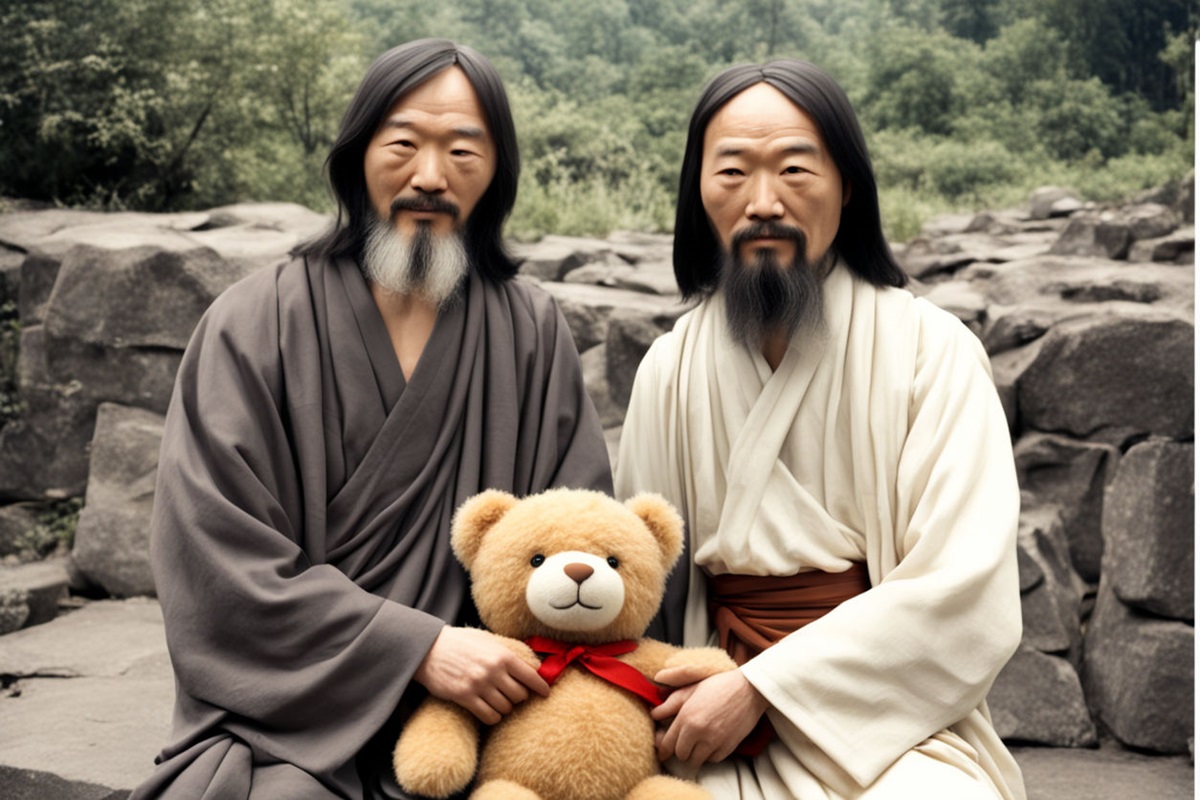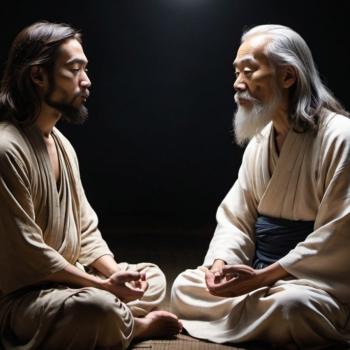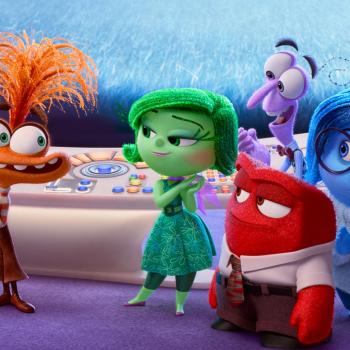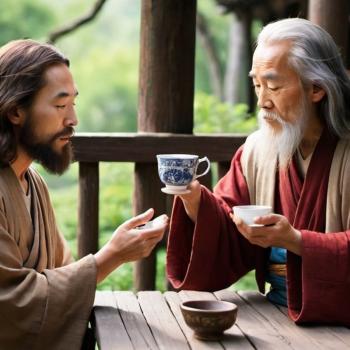What does the Bible mean when it says that Jesus emptied himself? Taoist philosophers Lao Tzu and Winnie the Pooh offer some insight.

We live in a world preoccupied with acquiring more, filling ourselves to the brim. But Jesus, Lao Tzu, and Winnie the Pooh suggest that emptiness is a better way to be useful.
Lao Tzu’s Tao Te Ching, Chapter 11
JH McDonald Version
Thirty spokes are joined together in a wheel,
but it is the center hole
that allows the wheel to function.
We mold clay into a pot,
but it is the emptiness inside
that makes the vessel useful.
We fashion wood for a house,
but it is the emptiness inside
that makes it livable.
We work with the substantial,
but the emptiness is what we use.
The Value of Emptiness
This verse parallels many others in the Tao Te Ching that praise the virtue of emptiness. Adding to the well, valley, cup, womb, and bellows, Tao Tzu illustrates emptiness with the hole in a spoke, a pot, and a doorway. It’s easy to fill your life with things like material possessions, job responsibilities, and social status. But it is emptiness that makes one the most useful.
The Empty Center
Lao Tzu says that thirty spokes join together to form a wheel, but it is the center hole that allows the wheel to function. In Christian cosmology, the apostle John paints a picture of the wheel-like throne of God, surrounded by twenty-four elders and the four living creatures. All the elders cast their crowns before the throne, causing us to believe that the one who sits on the throne is the highest and mightiest of all. Yet, Jesus does not take the throne because of his importance. Rather, it’s because he emptied himself and made himself last. This empty center gives the rest meaning and purpose.
The Emptiness Inside
The Tao Te Ching says we mold clay into a pot, but it is the emptiness inside that makes the vessel useful. We fashion wood for a house, but it is the emptiness inside that makes it livable. Jesus was not full of himself but emptied himself so he could be filled with the Tao. Paul wrote to the believers at Philippi:
Let the same mind be in you that was in Christ Jesus,
who, though he existed in the form of God,
did not regard equality with God
as something to be grasped,
but emptied himself,
taking the form of a slave,
assuming human likeness.
And being found in appearance as a human,
he humbled himself
and became obedient to the point of death—
even death on a cross.
Emptying Ourselves Like Jesus
For Jesus, emptying himself was everything. Unless he emptied himself, he could have accomplished nothing. Of what did Jesus empty himself? Some suggest that in the incarnation, Jesus emptied himself of divine privilege. This may be true, or it may not. That isn’t the purpose of this scripture. Instead, the apostle encourages the reader to copy the attitude of Christ. This is the point—to empty ourselves in the same way that Jesus did.
Emptying Ourselves of Ego
Emptying ourselves of divine privilege is not the point. Rather, if we are to mirror the attitude of Jesus, we must empty ourselves of ego. Paul reminds us not to think of ourselves more highly than we ought. Had the pre-incarnate Christ allowed the grandeur of heaven to produce an inflated divine ego, there would never have been a kenosis, or self-emptying of God in the incarnation. Instead of basking in eternal worship, Christ emptied himself of ego, adopting the form of a servant so that he could be the hub to which all things are connected. In fact, it could be said that at his best, the Anointed One emptied himself of Jesus until all that remained was the emptiness and openness of Christ, the Tao.
The Useful Pot
Following this example, we empty ourselves of ego and allow ourselves to be used. In The Tao of Pooh (pg. 84), author Benjamin Hoff recounts A.A. Milne’s tale of Winnie the Pooh, as an example of this Taoist principle of emptiness. Pooh starts with a pot of honey to give to Eeyore for his birthday. But, in typical Pooh fashion, he forgets his purpose and eats all the honey. In the end, he gives Eeyore the Useful Pot—just the perfect container to put things in. Had Pooh not emptied the Useful Pot, all he could have given was a jar of honey.
Like the hub, we allow ourselves to be connected to all things. Just like the Useful Pot, we allow ourselves to be emptied. And like the house, our value is found in emptiness rather than fullness. Fill up the house completely, and you say a hoarder lives there. Have just the right amount of space, and you say there is room to breathe. Lao Tzu said, “We work with the substantial, but the emptiness is what we use.” By emptying ourselves, as Jesus did, we make ourselves useful.
Something to Practice…
Consider how you can practice your own style of kenosis. Emptying your life of things that are unnecessary, you make room for divine flow. Emptying yourself of ego, you become a temple of the Holy Spirit. What are some practical ways you can create some breathing space in your life today?


















